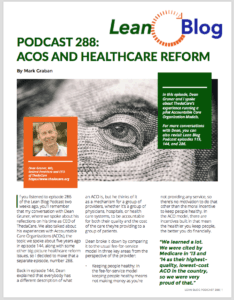
Joining me again for Episode #288 is Dean Gruner, MD, the recently retired CEO of ThedaCare, a health system in Wisconsin that has long been considered a worldwide leader in the practice of Lean in healthcare.
Recently, in Episode #286, Dean shared his reflections on his work and ThedaCare's “Lean journey.” Today, the topic is Accountable Care Organizations and other bigger-picture healthcare reform topics.
Dean was also previously my guest in Episodes 119 and 144.
I'm including a full transcript along with a three-page PDF summary, as I've been doing recently.
Streaming Player (Run Time 16:40)

For a link to use for this episode, refer people to www.leanblog.org/288.
For earlier episodes of my podcast, visit the main Podcast page, which includes information on how to subscribe via RSS, through Android apps, or via Apple Podcasts. You can also subscribe and listen via Stitcher.
PDF Episode Summary
You can download a PDF summary of this post:

- Low-res PDF (for reading on screen)
- High-res PDF (for printing)
Transcript:
Mark Graban: Dean, thank you so much for returning to the podcast. How are you today?
Dean Gruner: I'm great, and I'm looking forward to this.
Mark: First off, I should say, well, I'm happy to hear you're doing great. Happy retirement to you, by the way. How long has that been now? [laughs]
Dean: About six weeks, but who's keeping track?
Mark: [laughs] If I'd asked that same question back when you were working, I probably would have gotten the same response, and I'm happy that we have the chance to hear some of your reflections on your tenure as CEO at ThedaCare, your career, and lessons learned. Thank you again for being willing to do that today.
Dean: You bet. Happy to share.
Mark: There might be a few listeners here who have listened to every single podcast going back. I want to follow up on…We've had a couple of conversations in the past. In particular,leanblog.org/144 from, boy, about five years ago. For anyone who hasn't listened to that, you can find that at leanblog.org/144.
Dean, you talked to us about ACOs, Accountable Care Organizations. You said, at the time, you were doing an experiment, 20 percent of the health system revenue. I'm curious what your thoughts are on how that experiment played out over time. What are some of your reflections on that?
Dean: We learned a number of things. The 20 percent experiment was with the Pioneer Program we did with Bellin Health in Green Bay. That's a joint venture, so to speak. We did that from 2012-2014. We learned a lot.
We were cited by Medicare in '13 and '14 as their highest quality, lowest cost ACO in the country, so we were very proud of that. Then, we sat out 2015 for a transition year, and we have continued now with NextGen in '16 and '17. Between both pilots and our own employs, it's been about 20, 23 percent of our revenue stream in total cost of care risk.
Mark: What kind of organization is NextGen? Can you maybe give a bit of background of how that ACO partnership works and what that meant for you in that?
Dean: NextGen is the next generation of CMMI's total cost of care risk platform. The Pioneer has migrated to NextGen. We have an ACO with physicians and ourselves, but one of the things we've learned, though, is over the last five, six years, we had numerous conversations periodically with some of the large insurance companies.
They had told us that they were piloting different forms of total cost of care risk with providers around the country and that, as soon as they were ready, they would be willing to talk to us and expand that to our platform. In fact, that's never happened.
We're disappointed with that and, I'd say, a little disillusioned with that, too, in that we think that the large for-profit insurance companies really do not have a sincere interest in sharing total cost of care risk with provider systems.
Mark: For my imperfect understanding of all of this, Next Gen was an evolution of the Pioneer framework. You said you originally partnered with Bellin Health, which was more of a primary care clinic organization. Is that right?
Dean: No, they're an integrated delivery system like we are. They have two hospitals and employ physicians. They have a lot of independent physician partners, as well.
Mark: That partnership, that ACO with them, ended though. Correct?
Dean: That did. We transitioned it to each forming our own ACOs, but we still work together closely. In fact, we will anticipate in the next one or two months announcing a new joint venture with a separate insurance company that we think has very high potential to deal with the triple-aim issues that most of us aspire to achieve.
Mark: Can you elaborate a little bit when you say commercial insurers generally don't have interest in these shared models? What do you think is the cause of that or some of their thinking on that?
Dean: I'll give you a little bit of my background and then tell you what I think in an unvarnished truth, in my perspective. It may not be truth, but I started off as a family practice physician. Four years into practice I was the lead physician when we formed our own HMO, our own provider-sponsored health plan.
We had 17 years when we sold that health plan. That was 13 years ago. What I believe to be the case is that large, for profit insurance companies are in business to make money for their shareholders. Although they talk a good game about how they're doing things to cool down the cost, the fact of the matter is they make a certain percent margin, on average, off premium dollar.
As the premium dollar goes up 6, 10, 14 percent a year, they make that percentage up a larger and larger revenue base. They will deny this until the cow comes home. I definitely believe that they really are not as altruistic as they would claim to be. The reason they put in different mechanisms to reduce cost is so they can make more money.
In fact, if they were to shift that total cost of care risk to providers, then when providers redesign healthcare using lean and other strategies, and improve the quality of care, and reuse the cost, the provider systems would benefit financially from doing that work.
Today, when we do great work and redesign things, the beneficiary of that is the insurance company. They get the profit from our labor. They don't really want to change that because it's working well for them, so why would they change that?
I can't explain why else, after five to seven years of conversations with insurance companies, why none of them have been able to follow through on what they claim they want to do in 2010, '11 and '12, right after the Affordable Care Act was passed?
Mark: One element of the Affordable Care Act, which I've already [laughs] demonstrated through my questions. I'm not an ACO expert. I'm not an ACA expert. The one aspect, the Medical Loss Ratio — or it's sometimes called the 85/15 rule if I have this right — where the insurers have to spend 85 percent premiums on care.
It seems like, if I we're running a business, a larger pie benefits the insurer. It seems like a disincentive to helping keep spending down.
Dean: What people don't talk about is what happens to that 15 percent. Most large national insurance companies are proud of the fact that their admin costs — their administrative overhead — probably is between six and eight percent. Their profit margin, then, probably is seven to nine percent.
It can be covered up by all sorts of clever things that CFOs do. You can cost over it RMD expense, and this, and that, and the other thing, but it's a significant profit margin on average. As the revenue enlarges, that 15 percent becomes a bigger and bigger number. I really don't think they have…It doesn't benefit them.
If they were to have healthcare cost stay flat year after year after year, they don't win. If it's a capitalistic structure that we're in, I guess you can say you don't blame them because they're there to make a profit for their shareholders. They're not there to…That sounds pretty jaded, I supposed, but it's not intended to be jaded.
It's just intended to…Let's take away the magic screen behind the “Wizard of Oz,” and let's just call it what it is.
Mark: What you say makes sense. I put my MBA hat on. I figure lot of times things are explained by systemic structures. I've seen some analysis recently that talked about not just insurance companies, but pharmacy benefit manager programs, and a lot of these structures that just have real disincentive to keep cost down.
Even though the pharmacy benefit managers would claim to somebody, “We're helping you manage and keep those costs under control,” but they seem to systemically make more profit off of higher pharmacy costs.
Dean: If you want to talk about that, in about 2000 we brought our pharmacy benefit manager in-house for our health plan. Then we subsequently created a separate company from that PBM experience. That company is very successful, but we learned the dark secrets of the PBM business when we did that.
They told us that it was incredibly risky to bring it in-house, and it was risky, and it was very difficult. Oh, my goodness, how challenging that was. What we found was that the PBM we had used previously had consistently given us about dollar per member per month of rebate. They would get that about nine months delayed.
We brought that in-house. Within one year we were getting more than five dollars per member month rebate and we got it within 90 days. We were absolutely believers that they used that rebate to make a huge profit margin off of our work.
Mark: It was in relation to ThedaCare the health system not ThedaCare of the employer. Right?
Dean: That was related to Touchpoint Health Plan, which was owned 50/50 by ThedaCare and physicians. I was the Chief Medical Officer helping to lead that organization. That was one of the things that I worked out with other people to do. We rolled back the curtain behind the Wizard of Oz and the PBM industry, and there are better ways to do it.
Mark: Do you think what you experienced is fairly representative of broader trends if the Affordable Care Act remain…and who knows? By the time I have this podcast published, who knows any of this? [laughs]
Let's say the Affordable Care Act remains the law of the land. Are there reforms or changes that would be helpful in this regard in terms some of these incentives regarding ACOs, the medical loss ratios, pharmacy benefit margins?
Dean: The way I try to explain this, Mark, is using the principles that we learned within lean. If you do something and you do an improvement event, you're usually very happy using the 80/20 rule. You got 80 percent have it right, and I think that's what happened with the ACA. It got 80 percent of it right, roughly. What do you do with the 20 percent that's not working so well?
You do a plan, new study, or just cycle it. You study it and adjust it. The logical thing to do with the Affordable Care Act is to keep the 80 percent that's working pretty well and identify the 20 percent that's not.
Part of it is, the exchanges are at risk in many communities as well. They're at risk because what was feared by insurers has happened. Which is, young healthy people have chosen to not buy health insurance and instead pay the penalty.
The principle of insurance is that the healthy people help offset the sick people, just like car insurance. Someday you're going to be in a car accident, most likely. The nine years you're not in a car accident your premiums are going to pay for somebody who had a car accident. The reverse is true in the year that you might have one.
The same principle applies to healthcare. Except, if you have a lot of the healthy people opt out, then there are real losses for insurance companies. A lot of the insurance companies are dropping out of the exchanges because the way that law is written.
It doesn't force the healthy people into the marketplace so that their premiums can be used to offset the people that are unlucky and unhealthy in any one year.
Mark: It seems like the penalties, even though they have increased over time, are still apparently low enough to be bearable by a lot of people. Right?
Dean: I don't know the details of that. I'm not an expert on that, but the principle is, “Is that in play?” That's what's happening.
What do you think? Please scroll down (or click) to post a comment. Or please share the post with your thoughts on LinkedIn – and follow me or connect with me there.
Did you like this post? Make sure you don't miss a post or podcast — Subscribe to get notified about posts via email daily or weekly.
Check out my latest book, The Mistakes That Make Us: Cultivating a Culture of Learning and Innovation:









